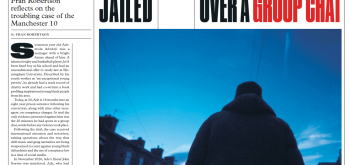At the age of 24 years – and after having epilepsy since I was 16 years old – I had my first child. The pregnancy sailed along with less seizures than anticipated, and our son Lee was born five days late with no problems or complications.
- This article was written by Janet Williams with Emma Murphy
- Thanks to Grumpy-puddin for use of the pic.
It was 12 hours into his life that things started to happen, he became very jittery, very sleepy and floppy and refused to feed and so was taken to the baby care unit where he was weaned of my anti-convulsant drug. We had no idea at this point that he could have been born reliant on sodium valproate or that it could have affected his development. We were both kept in hospital for seven days before we were allowed to take him without any explanation at all about fetal valproate syndrome. As Lee was kept under regular reviews and, to us, seemed to be progressing steadily we could presume everything was ok.
Five months later, I fell pregnant again, although this time things were to be totally different. Only 16 weeks into the pregnancy, after three scans I was sent back to see my neurologist. He then explained the possibility of spina bifida due to the valproate I was taking for my Epilepsy, however it was not a certainty that my child had spina bifida as the scans we inconclusive and I was given the choice to terminate the pregnancy ‘just in case’.
This was the toughest decision of our lives, and one which seemed obvious, what mother would terminate on a maybe? Philip was born 14 days late, had crossed toes but seemed fine. However the problems were to come for both of them as they progressed. Due to the valproate their development was delayed, they both went through numerous childhood operations, grommets, hernias, squint straightened and tonsillectomies.
Their education was to suffer to due to their problems with their working memory, speech and language with the late diagnosis of an autistic spectrum disorder. It was then I felt that I wanted to do something to share my experiences with other parents and help support other families and so in January 1999 I founded the Organisation for Anti-Convulsant Syndrome.
Some 13 years on and things changed again, due to end of the Fetal Anti-Convulsant litigation against the drug company Sanofi where over 100 families were involved, Emma Murphy and I decided to leave OACS behind and set up IN-FACT .
The Independent Fetal Anti-Convulsant Trust (IN-FACT) was launched in November 2012 by Janet Williams and Emma Murphy. Both have experience within the subject of Feta Anti-Convulsant Syndrome, working for other FACS charities in the past, with Janet Williams working for 17 years on this topic.
IN-FACT will be interlinked with the FACS Syndrome Association (FSA) also set up by Janet and Emma to support the families affected so that they will only have to register once. Working with four medical advisors experienced in this field, two experienced geneticists, a clinical psychologist/researcher and a consultant paediatrician specialising in childhood epilepsy and autism, together with the support of the Thalidomide Campaign Team, IN-FACT intends to push on with its campaign for compensation from both the drug company Sanofi, who are the largest supplier of Sodium Valproate in the UK, and the Government for the affected people enabling them to lead a more productive life.

L-R, front: Dr Peter Turnpenny; Janet Williams; Emma Murphy; back left Mikey Argy and Guy Tweedy (Thalidomide Trust Campaign Team)
IN-FACT was set up in November last year originally to raise awareness of Fetal Anti-Convulsant Syndrome in Parliament, calling for government redress and for both the Government and the drug company Sanofi to accept its corporate responsibilities by financially supporting the people that have been affected and appealing for women who have taken Sodium Valproate (Epilim) in pregnancy from 1973 to date, a total of 40 years to come forward.
Fighting the same battles
Since setting up in November we have held numerous individual meetings with MPs to discuss the effect Fetal Valproate Syndrome in particular is having. Currently we have the support of approximately 30 MPs and have already tabled the Early Day Motion (EDM) 1021 supported by MP’s asking for a public Inquiry as to why the damages caused by Valproate in pregnancy have been ignored for 40 years and to push for policy change so that we learn for the future with better regulations in place. We have applied for a Westminster Hall Debate, where the topic of Fetal Anti-Convulsant Syndrome and its complexities can be discussed for up to 90 minutes.
Over the years of the product liability case, which sadly came to an end in 2010, we have learned that not only have that the likes of the Legal Service Commission been against the litigation, but so has the Consumer Protection Act. This was put in place after the thalidomide scandal of the 1960s and 1970s so that this could never happen again, however 40 years on and here we are again, fighting the same battle only this time the law of the land is against us also.
It seems with the changes to the legal services within clinical negligence cases and the product liability cases that these issues may never been raised in a court room again, ven though, on the 31st January this year a medical paper was released stating the Valproate taken during pregnancy was to blame for children having neurodevelopmental disorders and autism.
We have learned a lot from the FAC Litigation and it is obvious that the Consumer Protection Act (and the European Directive) is protecting the manufacturers and the pharmaceutical companies and not the consumer and patients as it was set up to do.
Over the 40 years Valproate has been on the market approximately 20,000 children have been affected by this drug during pregnancy. It is our belief that this huge cost to the taxpayer -almost £6bn in education alone per year – should be faced by the drug companies. Surely it is their corporate responsibility to ensure that their drugs are safe and that adequate warnings are given at all times?
Sanofi claim that they have always given information in line with scientific knowledge, however we believe that’s not true. Patient Information Leaflets didn’t appear until the early 1990s and the drug was introduced in the UK in the early 1970s.
It is the Government that needs to step up to the mark. The Consumer Protection Act needs to be changed to actually protect the consumer against the damage these companies have got away with for so long. We are aware that the Committee for Safety on Medicines (CSM) have reported on Fetal Valproate Syndrome since 1983 but have never intervened, and the MHRA have only sat and watched as so many children were harmed by the drug.
IN-FACT are now working with other support groups internationally, such as APESAC, our French equivalent, who support the need for changes within Europe and we intend to push forward ensuring these demands are met in such a way that ‘Valproate Syndrome’ never happens again.








A detailed critique of the Court of Appeal judgment in the case of Oliver Campbell